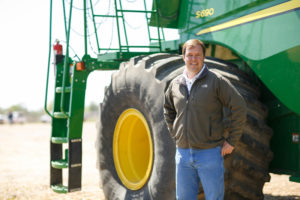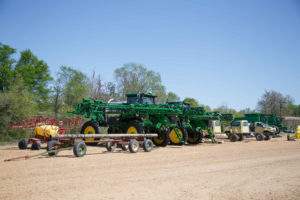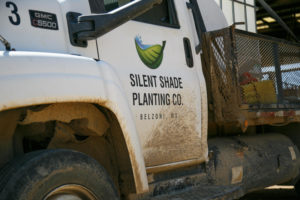By Mark H. Stowers • Photography by Austin Britt
 The Farm Shop—a place where the work gets done to keep the farm moving ahead. Whether its repairs, creating a time saving device or getting equipment ready for the field or just about anything else, the farm shop and headquarters can be a productive and busy place to be. At Silent Shade Planting Company in Humphreys County, co-owner Jeremy Jack and his family have been adding acreage to the farm in both Holmes and Leflore Counties since his father, Willard came south from Canada in the 1970s in search of a new farm home. The family farm has won numerous awards for their production on the turnrow and their ingenuity in the industry.
The Farm Shop—a place where the work gets done to keep the farm moving ahead. Whether its repairs, creating a time saving device or getting equipment ready for the field or just about anything else, the farm shop and headquarters can be a productive and busy place to be. At Silent Shade Planting Company in Humphreys County, co-owner Jeremy Jack and his family have been adding acreage to the farm in both Holmes and Leflore Counties since his father, Willard came south from Canada in the 1970s in search of a new farm home. The family farm has won numerous awards for their production on the turnrow and their ingenuity in the industry.
With peanuts, cotton, rice and soybeans in the fields, the farm has plenty of need and use of the shop and headquarters located in Belzoni. And there’s plenty of room to work in the Silent Shade Planting Company Shop.
“We’ve got a big shop right next to the office here,” Jack said. “We have two drive through bays where we can pull equipment in and right back out. We can actually get two eighteen wheelers in at a time. I can do four 18-wheelers at a time or two combines and three tractors on the other side.”
The middle of the shop is where a bit more creativity happens as this is the fabrication area.
“We have work benches but we also have our torches, welders, band saws and presses. When they are working on equipment and something needs to be added or adjusted we can create something new to put back on the equipment,” he said.
The far side of the shop includes a big open area that can be used for quite a few things. Jack uses the space for oversized equipment used in the field that may need repair or adjustments or cleaning.
“We can fold them out and flip them over, whatever we need to do to them,” he said. “There’s lot of space inside to work. We can tear it apart see what part we need. Then tear another one apart and see what part we need and go onto something else. So, we can have two or three projects on the go there at the same time while we’re waiting on parts to come in. It makes it really nice to have a big open area.”
work. We can tear it apart see what part we need. Then tear another one apart and see what part we need and go onto something else. So, we can have two or three projects on the go there at the same time while we’re waiting on parts to come in. It makes it really nice to have a big open area.”
Gone are the days of a smaller shop as equipment has grown over the years. Jack and his counterparts know there will also be a demand for space to work on the growing equipment.
“It’s nice to be able to pull in one of those great big pieces of equipment and still have room to work,” he said. “The shop itself is 210-feet long by 80-feet wide. That’s a large shop.”
Inside the shop the needed mechanical tools are there as well as spare parts, welders and much, much more.
“We have bench grinders, hand grinders —all the tools that we need. And we have a parts room. Every time you need something you don’t have to run to the parts store. We keep the basic—standard bolts, metric bolts, fine thread bolts, carriage head bolts, grade 8 bolts, and any type of fuses and lights. We stock a certain number of parts that we know are going to break. We have oil and greases—any type of fluid we’re going to need. And an extremely large air compressor as well.”
To move things around the shop, Jack doesn’t rely on overhead cranes but the use of forklifts.
“We use forklifts to pick up stuff not only to bring in and out but to pick things up inside the shop instead of having a crane in a certain area. We also stock a large amount of wood and steel for fabrication purposes,” he said.
They also keep a desk with a computer for work and to hold meetings with the overly large number of staff who are part of the Silent Shade Planting operation.
 “The computer also has a screen on the outside so if we have someone in for training or do some internal training, we have a screen on the outside, so we can watch videos and PowerPoints. We don’t have an office big enough for the entire staff, so we just go out to the shop,” he said. “It’s a great place for education and safety training. We also can put up announcements on that, so the guys can read that throughout the day.”
“The computer also has a screen on the outside so if we have someone in for training or do some internal training, we have a screen on the outside, so we can watch videos and PowerPoints. We don’t have an office big enough for the entire staff, so we just go out to the shop,” he said. “It’s a great place for education and safety training. We also can put up announcements on that, so the guys can read that throughout the day.”
The training at Silent Shade includes cross-training so if “you break it, you can fix it” in the expansive shop area with the needed tools and parts on hand.
“Certain guys are responsible for certain pieces of equipment, so they are trained to fix and repair that equipment. But we try to cross train everybody, so anyone can fix anything. So, they don’t have to wait for someone else to fix something they broke. Whoever is operating it knows how to fix it.”
Jack did say they don’t do engine overhauls and other things but can deal with plenty of other repairs.
“If you’re responsible for peanut harvest then you’re responsible to have the peanut harvester ready to go,” he said. “The problem with not cross training is if you’re not worried about repairing it, you’re probably not worried about breaking it.”
Jack notes that “our shop is just more of a plain Jane ‘get work done’ shop but the guys do a good job of keeping it clean and we’ve got some team members that can push some equipment through there. If we’re not in the field, we’re basically in the shop working on equipment.”
A value-added space on any farm—the shop—where equipment is fixed, maintained, created and cleaned—all to keep Silent Shade Planting Company and many other farms like it, in the field, growing and harvesting need crops.
